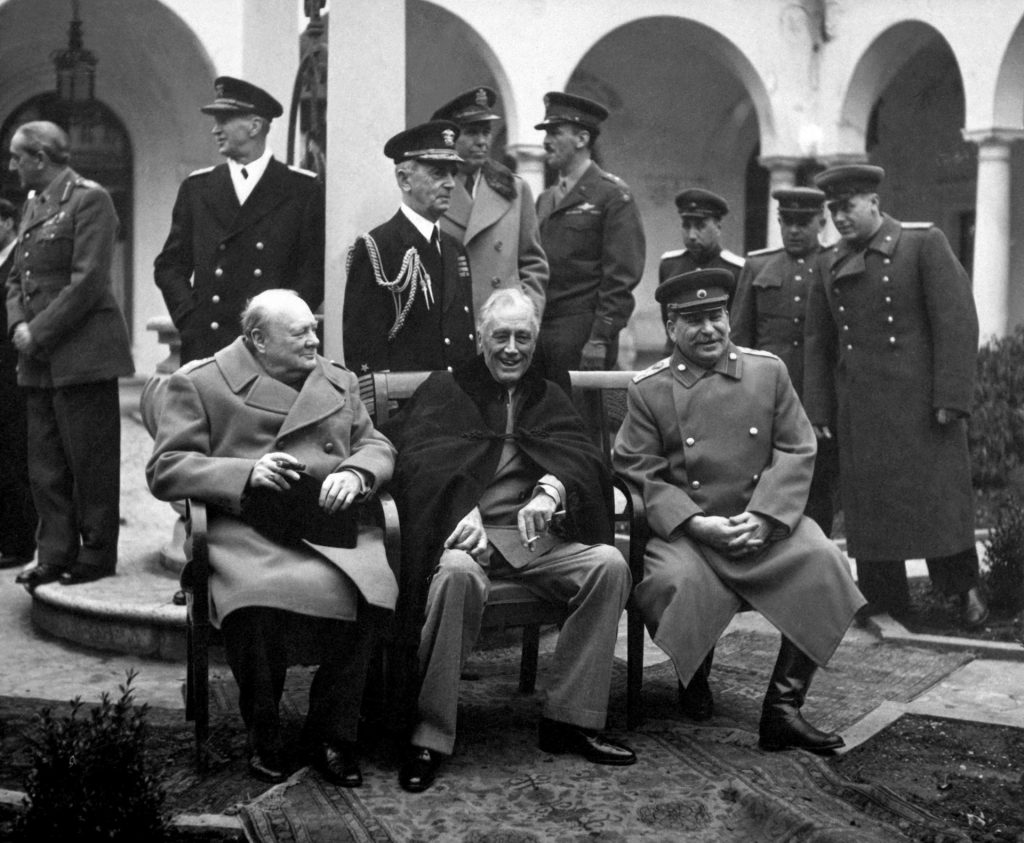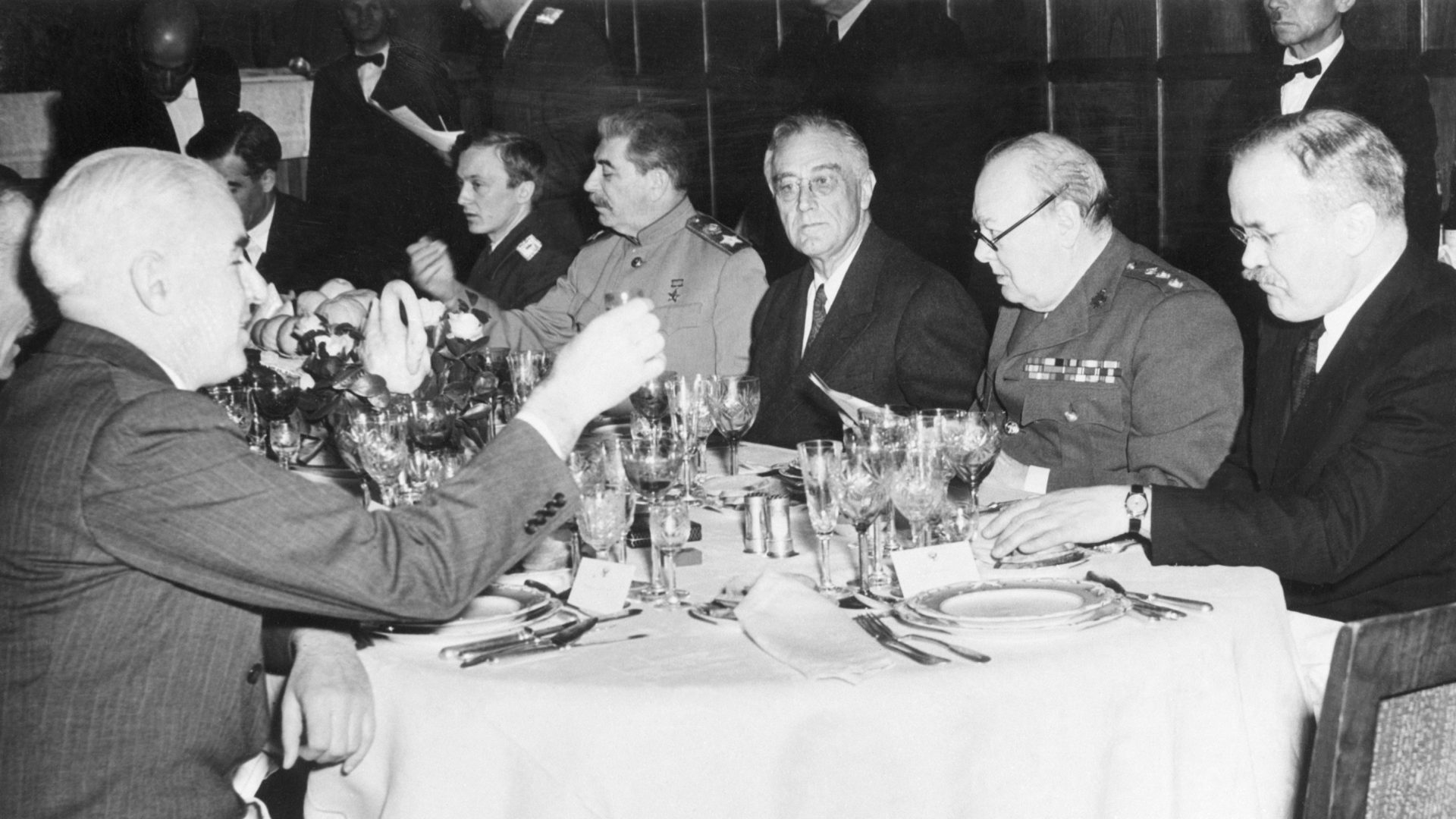It was February 1945, and peace in Europe was on the horizon following six years of conflict. But for Joseph Stalin, there was another battle looming – and the weapon he chose to guarantee victory was excess.
When Stalin, Franklin D Roosevelt and Winston Churchill arrived in the Crimean port of Yalta to carve up the post-war world, each was determined that while they had won the war collectively, the peace could be won individually. United only by their opposition to fascism, all wanted their own ideology to prevail, all were suspicious of the other’s motives and all had an eye on their place in history.
Stalin had a plan. The conference was on his turf. He’d wine, dine, outdrink and out-eat his rivals to the point of exhaustion, before presenting them with the Soviet Union’s vision of the post-war world to which they would surely accede. A gorging of realpolitik disguised as a surfeit of Russian hospitality.
One can appreciate the dictator’s thinking. If the conference delegates, specifically his US and British counterparts, spent the entire week stupefied via excess, then the Soviet Union was more likely to emerge with a favourable outcome. Of course, this meant having to outdrink the prodigious British prime minister whose daily intake of alcohol was already vaunted.

More than once, Winston Churchill declared that: “I have taken more out of alcohol than alcohol has taken out of me.” Rab Butler, later to serve as chancellor of the exchequer and foreign secretary, wrote that on several occasions dinner with the prime minister was “followed by libations of brandy so ample I felt it prudent to tip the liquid into my shoe.”
Stalin was well aware of the ferocious capacity of his British opposite number. In August 1942, they had met in Moscow. Alexander Cadogan of the Foreign Office witnessed the aftermath.
At 3am, he discovered “they had been joined by [Soviet foreign minister Vyacheslav] Molotov, sitting with a heavily laden board between them, crowned by suckling pig, and innumerable bottles.” He described the alcohol consumed as “savage”. It became clear to Cadogan that “Stalin’s hospitality involved large quantities of alcohol and he preferred negotiating with heavy drinkers.”
Roosevelt, however, was a different story. In 1945 he was a dying man ravaged by polio, no longer able to stand. Yet he was also president of the only victorious country to be spared the devastation wrought on Europe. The US was now the world’s dominant military and economic power. Stalin knew that well enough, but he also knew Roosevelt was faltering.
Each leader hosted a dinner but Stalin’s has taken on legendary status. He pulled out all the stops. Yalta may have been laid to waste by the Nazis with destroyed buildings, no running water and no electricity, but that was no impediment.
Trains from Moscow arrived hourly, bringing everything needed to transform the city’s Livadia, Yusupov and Vorontsov palaces. A thousand men and women set to work. The gardens were restored, the palace interiors gutted and redecorated. There were goldfish in the (now working) fountains and lemon trees in the hallways.
And then came the food and drink, and the silver cutlery, porcelain plates and cut glass used to consume it. As standard, there was caviar with every meal, fish and game served merely as hors d’oeuvres.
There followed beef, pork, shashlik, borscht, stroganoff laden with cream, more caviar, blinis, and the output of entire collective farms in potatoes, rice, vegetables and pickles. Then there was booze, gallons of it.
Before the Russian revolution, the Tsar’s wine cellar contained rare vintages in abundance. Hidden from the German invaders, they were now shipped to Yalta alongside cases of Armenian brandy and the entire output of the Massandra Winery, Crimea’s oldest vineyard. Cadogan again commented that Churchill was “drinking buckets of Caucasian champagne which would undermine the health of any normal man”.
Every bedroom was supplied with a decanter of vodka, replenished each morning. (For that matter, every bedroom was bugged so Stalin had a head start even before the drinking began). At mealtimes, waiters brought course after course, thrusting glasses of wine and spirits at the western diplomats, many of whom were carried almost comatose to their rooms at the end of every evening.
Then came Stalin’s centrepiece dinner at the Vorontsov palace, on February 10. The US State Department’s record says “the atmosphere was most cordial and 45 toasts were drunk”. Russian shouts of “drink it down” bellowed out whenever the glasses were lifted, although it’s been suggested Stalin’s glass was recharged with water, not vodka.
Meanwhile, the tables (and the guests) heaved with roast goose, partridges, goat, mullet… 20 courses in all. The menu is remarkable:
Snacks
Caviar, pies, marinated salmon and cured fillets of white salmon, spicy salted herring, sturgeon aspic, Swiss cheese.
Hot appetizers
Game, sausages, roast pig with horseradish, venison vol-au-vents.
Soups
Game broth, chicken cream soup.
Hot dishes
White salmon with champagne sauce, baked mullet, lamb skewers, wild steppe goat, lamb pilaf, roast turkey, roast goose, roasted quails, roasted partridges, green peas.
Dessert
Ice cream, fruit, petit fours, roasted almonds, coffee.
Churchill, naturally, took it all in his stride, which meant it was long past midnight before it dawned on him that Roosevelt was sitting silent and gaunt, his once-fabled dynamism and drive dissipated, now a totally spent force. Exactly as Stalin had planned.
For the rest of the conference, Roosevelt cut an irresolute figure, fatally weakened and incapable of intervening. Churchill would fight the west’s and the British Empire’s corner but he did not have the clout of the world’s largest military and its largest economy behind him. FDR did, but lacked the personal strength to match that of his nation.
Amid the bacchanalia, Stalin pretty much got everything he wanted: a divided Germany, forced to pay huge reparations and incapable of launching another war; an Eastern Europe in thrall to the Soviet Union and acting as a buffer around his nation; a veto on the yet-to-be-formed United Nations’ Security Council; and pretty much free-rein in the Pacific once Japan was defeated.
And although Churchill demanded self-determination for Poland, without US support he had no chance. What the prime minister termed the Iron Curtain had begun to descend.
From world war to cold war over the course of one week. And how much alcohol played its part has been debated ever since.
The US State Department’s report had no doubts, declaring alcohol had contributed to “the sellout at Yalta.” Meanwhile, noting that “the role played by alcohol at Yalta cannot be dismissed,” Congress cancelled the State Department’s wine budget. Za vashe zdoroviye!












